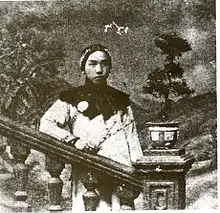Lai Man-wai | |||
|---|---|---|---|
 Lai in 1913 in Zhuangzi Tests His Wife | |||
| Born | 25 September 1893 | ||
| Died | 26 October 1953 (aged 60) | ||
| Occupation | Film director | ||
| Known for | Father of Hong Kong Cinema | ||
| Spouses |
| ||
| Children | Lai Hang (1928-1965) Lai Suen (b.1931) | ||
| Relatives | Lai Cheuk-cheuk (niece) Gigi Lai (grand-daughter) | ||
| Chinese name | |||
| Traditional Chinese | 黎民偉 | ||
| Simplified Chinese | 黎民伟 | ||
| |||
Lai Man-wai (Chinese: 黎民偉; pinyin: Li Minwei; September 25, 1893 – October 26, 1953), also romanised as Lay Min-wei or M.W. Ray, considered the "Father of Hong Kong Cinema", was the director of the first Hong Kong film Zhuangzi Tests His Wife in 1913. In the film, Lai played the role of the wife, partly due to the reluctance of women to participate in show business at the time.
Biography

Born in Yokohama, Japan, of Xinhui, Guangdong origin and raised in Hong Kong, he joined Sun Yat-sen's Kuomintang party in 1911 and helped make anti-warlord movies. He was an active director during the golden years of the Shanghai movie industry from 1921 to 1928. In 1923, he founded the China Sun Motion Picture Company with his brother, Lai Pak-hoi, in Hong Kong which later relocated to Shanghai. In 1930, he co-founded one of the "Big Three" studios of the 1930s, Lianhua Film Company, with Lo Ming-yau. Lianhua, together with other leading Shanghai studios, was destroyed when the Empire of Japan attacked Shanghai in 1937. Lai returned to Hong Kong in 1938 and retired.
He was married to Lim Cho-cho, a Vancouver-born actress. His daughter Lai Suen and granddaughter Gigi Lai are both actresses.
Memory
His story was documented in Lai Man-wai: Father of Hong Kong Cinema by Choi Kai-kwong in 2001.
Lai Man-wai is portrayed in Stanley Kwan's 1991 biopic of actress Ruan Lingyu, Center Stage by Hong Kong actor, Waise Lee.
Partial filmography
- Zhuangzi Tests His Wife (1913)
- Romance of the Western Chamber (1927) directed with Hou Yao
- The Battle of Shanghai (1937)[1]
- A Page of History (1941). Documentary. Lai Man-wai followed Sun Yat-sen during the 1920s.[2][3]
References
- ↑ Aitken, Ian (2014). Hong Kong documentary film. Edinburgh: Edinburgh University Press. p. 39. ISBN 9780748664696.
- ↑ Hong Kong Film Archive: "From Revolution to War"
- ↑ "HK Film Archive's "100 Must-See Hong Kong Movies" to screen historically significant films"
Further reading
- Ho, Sam (2004). Hong Kong Cinema: A Cross-cultural View. Scarecrow Press. ISBN 9780810849860.
External links
- His Origins in Xinhui - http://www.southcn.com/news/gdnews/sh/hrjnh/fyrw/200409020627.htm
- Lai Man-wai at IMDb